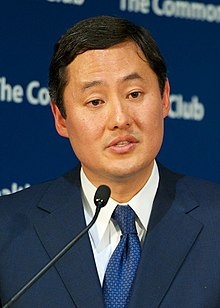
Back جون يو (محامي) Arabic جون يو (محامى) ARZ John Yoo German John Yoo Spanish John Yoo French ジョン・ユー Japanese 존 유 Korean 柳约翰 Chinese
John Yoo | |
|---|---|
| 유준 | |
 Yoo in 2012 | |
| Deputy Assistant Attorney General for the Office of Legal Counsel | |
| In office July 2001 – May 2003 | |
| Appointed by | Jay S. Bybee |
| President | George W. Bush |
| Member of the National Board for Education Sciences | |
| Assumed office December 2020 | |
| President | Donald Trump Joe Biden |
| General Counsel for the Senate Judiciary Committee | |
| In office July 1995 – July 1996 | |
| Personal details | |
| Born | Yoo Choon July 10, 1967 Seoul, South Korea |
| Political party | Republican |
| Spouse | Elsa Arnett |
| Education | Harvard University (BA) Yale University (JD) |
| Occupation | Law professor |
| Known for | "Torture Memos" (2002) |
| Awards | Federalist Society Paul M. Bator Award (2001)[1] |
| Korean name | |
| Hangul | 유준 |
| Hanja | 有俊 |
| Revised Romanization | Yu Jun |
| McCune–Reischauer | Yu Chun |
John Choon Yoo (Korean: 유준; born July 10, 1967)[2] is a South Korean-born American legal scholar and former government official who serves as the Emanuel S. Heller Professor of Law at the University of California, Berkeley. Yoo became known for his legal opinions concerning executive power, warrantless wiretapping, and the Geneva Conventions while serving in the George W. Bush administration, during which he was the author of the controversial "Torture Memos" in the War on Terror.
As the deputy assistant attorney general in the Office of Legal Counsel (OLC) of the Department of Justice, Yoo wrote the Torture Memos to determine the legal limits for the torture of detainees following the September 11 attacks. The legal guidance on interrogation authored by Yoo and his successors in the OLC were rescinded by President Barack Obama in 2009.[3][4][5] Some individuals and groups called for the investigation and prosecution of Yoo under various anti-torture and anti-war crimes statutes.[6][7][8][9]
A report by the Justice Department's Office of Professional Responsibility stated that Yoo's justification of waterboarding and other "enhanced interrogation methods" constituted "intentional professional misconduct" and recommended that Yoo be referred to his state bar association for possible disciplinary proceedings.[10][11][12][13] Senior Justice Department lawyer David Margolis overruled the report in 2010, saying that Yoo and Assistant Attorney General Jay Bybee—who authorized the memos—had exercised "poor judgment" but that the department lacked a clear standard to conclude misconduct.[14][12]
- ^ "Past Bator Award Recipients". fed-soc.org. Archived from the original on May 19, 2010. Retrieved February 5, 2020.
- ^ Contemporary Authors Online, Thomson Gale, 2008.
- ^ White House Office of the Press Secretary (January 22, 2009). "Executive order: Interrogation". USA Today. Archived from the original on October 26, 2012. Retrieved March 28, 2013.
- ^ Warrock, Joby; DeYoung, Karen (January 23, 2009). "Obama Reverses Bush Policies On Detention and Interrogation". The Washington Post. Archived from the original on April 13, 2013. Retrieved March 28, 2013.
- ^ Arsenault, Elizabeth Grimm (May 8, 2018). "Analysis | With (or without) Gina Haspel at CIA, could Trump revive the torture program?". Washington Post. ISSN 0190-8286. Retrieved November 8, 2022.
- ^ Cite error: The named reference
monsterwas invoked but never defined (see the help page). - ^ The New York Times Editorial Board (December 22, 2014). "Opinion | Prosecute Torturers and Their Bosses". The New York Times. Archived from the original on March 21, 2020.
- ^ Wiener, Jon (December 12, 2014). "Prosecute John Yoo, Says Law School Dean Erwin Chemerinsky". The Nation. Archived from the original on December 19, 2014. Retrieved December 15, 2014.
- ^ Greenwald, Glenn (April 2, 2008). "John Yoo's War Crimes". Archived from the original on May 7, 2008. Retrieved April 27, 2008.
- ^ Cite error: The named reference
DOJreportwas invoked but never defined (see the help page). - ^ Cite error: The named reference
OPRwas invoked but never defined (see the help page). - ^ a b Cite error: The named reference
Isikoffwas invoked but never defined (see the help page). - ^ Hunt, Kasie (February 19, 2010). "Justice: No misconduct in Bush interrogation memos". POLITICO. Retrieved November 9, 2022.
- ^ Hunt, Kasie (February 19, 2010). "Justice: No misconduct in Bush interrogation memos". POLITICO. Retrieved November 8, 2022.